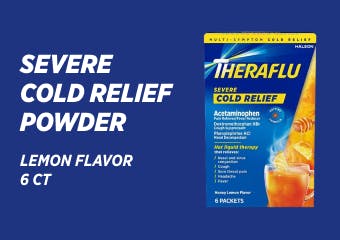Busting the ‘Feed a Cold, Starve a Fever’ Myth
The first thing to note is that fever itself is not actually an illness, while a cold is.
Colds are caused by viruses and may result in a number of unpleasant symptoms – including a stuffy nose, coughing, sore throat and, very occasionally, fever.1 A fever, however, can be a symptom of a cold, the flu or any kind of bacterial or viral infection.2,3
Colds and the Flu Need Fluids to Help Treat Them
One of the most important steps in helping to treat cold and flu symptoms, including fever, is to keep up your fluid intake to help prevent dehydration.1,4 This can be done by drinking water or other liquids, such as tea, broth or soup.4,5
And because your body needs fluids to support its recovery, ‘starving’ it of this essential hydration will do little to help treat the cause of your fever – and instead may even keep you from feeling better.5
Nutritious Foods Can Help to Support Your Immune System
Another reason not to act on the ‘feed a cold, starve a fever’ myth when you’re feeling ill is that certain foods can actually help to support our immune systems. A healthy and strong immune system can help to protect you from cold and flu viruses in the first place.6
Vitamin C is vital for immune function – as well as bone structure, iron absorption and healthy skin. But since our bodies don’t produce vitamin C naturally, we have to get it from either our diet or vitamin supplements. This important vitamin is found in many healthy foods – including citrus fruits, strawberries, green vegetables and tomatoes.7
A nutritious diet that is high in fruits and vegetables is also one of the easiest ways to help support your immune system and general health – whether you have a cold, fever or neither – so it isn’t wise to starve your body of these foods at any time.8

This important vitamin is found in many healthy foods – including citrus fruits, strawberries, green vegetables and tomatoes.7
Feeding Colds and Fever – Listen to Your Body
Ultimately, if you are suffering from a cold or a fever, it’s important to listen to your body when it comes to food.3
Since our immune systems do need nutrients, it’s a good idea to keep up some calorie intake when you’re not feeling well – if you have the appetite. However, if your cold or fever has taken away your appetite, don’t force food down. The most important thing is to keep up your fluid intake, no matter how you’re feeling about food.3
Colds and Fever – How to Help Relieve Your Symptoms
Now that you know the old saying ‘feed a cold, starve a fever’ doesn’t have much merit – what should you do to help ease your cold symptoms or fever?
There are some at-home remedies you can do to relieve your symptoms. You can:
- Hydrate
When you stay hydrated, your body has the ability to flush more germs out of its system.10 You might not feel like drinking fluids, but a cold virus or flu can bring symptoms that might further dehydrate you. Make sure you drink more fluids than you usually would as you recover. Chicken soup is also a delicious way to stay hydrated while allowing the warm broth to relieve your symptoms.
- Sleep
Sleep has many benefits because it’s a time in which our body can reset its level of energy. Sleeping helps strengthen your immune system and prepare it to fight off viruses like the cold and flu.10 Sleeping with an extra pillow can elevate your head and release some of the sinus build up you might have.10
- Moisturize the air
Using a vaporizer, humidifier, or even placing small bowls of water around your home can increase the moisture that’s in the air.11 Cold weather can dry out air, and the dry air can increase your chances of getting a cold or flu.11 Some possible symptoms of a cold and flu are nasal congestion and chest congestion. By adding moisture to the air, it can help you breathe in the vapor and reduce your congestion.11
- Honey
Honey has antiviral properties that can relieve symptoms of a cold and flu.10 You can add honey to your tea to help stay hydrated and ease your sore throat. Honey also has properties that can prevent the growth of small organisms in our system.10 Children under the age of 1 years old should not ingest honey.
- Aromatherapy
Certain oils contain menthol, and menthol can help clear any congestion you might have.10 You can put oils like peppermint oil around your nose with a sensitive carrier oil, or in an oil diffuser to breathe it in.
There are many other things that you can try at home to help treat a cold or fever, but if you need some quick relief, an over-the-counter cold and flu medicine can help.
Fluid intake is an important part of treating a cold or flu. A liquid cold and flu medicine such as Theraflu Hot Liquid Powders can help to ease symptoms while also contributing to your fluid intake.1,4 Try Theraflu for relief from your worst cold and flu symptoms – including fever, headache, body aches, cough and sore throat.
Discover more cold and flu treatment options, including ways to help treat fever.
If your fever lasts longer than two days or at 103°F (39.4°C) or higher despite treatment, or is accompanied by a stiff neck, confusion or irritability, a rash, light sensitivity, dehydration or seizures, seek medical attention as soon as possible.9





